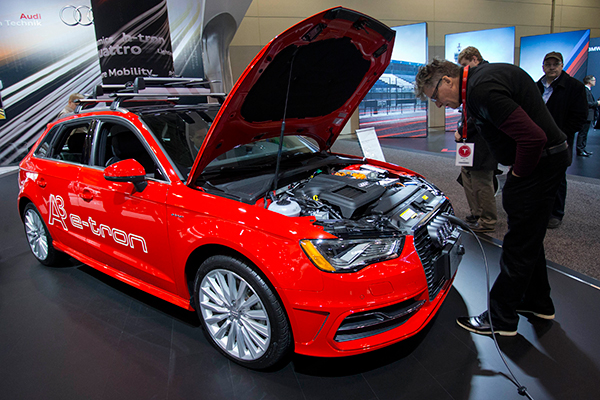 |
|
A visitor examines how a new-energy car is charged at an auto show in Toronto, Canada, in February. [Photo/Xinhua] |
China and Germany are further expanding their cooperation in battery recycling technologies, to consolidate the new-energy vehicle industrial ecology in the world's largest market.
Both countries are looking to encourage links between research institutes, companies and cities under the framework of the China-Germany Traction Battery Recycling Memorandum, and select model projects together, five years after they entered into a strategic partnership in the electric vehicle sector in June 2011.
"The progressive move is a further extension from the existing bilateral cooperation in NEVs. The two nations are closing the loop in industrial ecology, while NEVs are set to step into a new stage in their product lifecycle," said Zhang Junyi, a partner with Munich-headquartered Roland Berger Strategy Consultants.
Zhang continued: "The business path to recycle and reuse the batteries will be formulated for all the stakeholders as soon as the model projects are operating successfully."
He forecast that the Sino-German model projects would be run continuously for three to five years in China's NEV market, which is now the world's largest after overtaking the United States in 2015.
Data from the National Bureau of Statistics showed NEV production volume surged to about 54,000 units in May, almost double that of the same month last year.
May sales surged 128 percent year-on-year to about 35,000 units, according to the China Association of Automobile Manufacturers.
The traction battery recycling model projects are likely to involve not only battery makers but also car manufacturers that currently produce NEVs in China, for example, Daimler AG and BMW AG, and those that do so in the future. Volkswagen AG is one such automaker that will soon produce NEVs in China, according to Zhang.
German automaker Daimler AG and Chinese technology company BYD Co's joint venture, BYD Daimler New Technology Co, is researching and preparing for the recycling and reuse of batteries and called for immediate joint efforts to prepare for battery recycling.
BYD Daimler introduced its fully electric Denza marque in 2014, and will upgrade the model soon.
Hu Xiaoqing, marketing director of BYD Daimler, said: "All of the NEV makers, bearing long-term development in mind, are going to be responsible for sustainability, but we need to keep a close eye on how things develop."
She issued a reassurance for owners of the company's fully electric model.
"The batteries in Denza last longer than the cars, or at least have an equivalent lifespan, so there's no need for our customers to replace a battery," Hu said.
Hu expressed confidence that for BYD Daimler, battery recycling would only become an issue in the event that a Denza was scrapped, which she said is an unlikely prospect for owners. Further reassurance for the company came from the joint venture's stockholder and supplier BYD Co, which has stated that it can reuse the vehicle's traction battery units in its energy storage power stations to power its own new-energy business.
Zhou Xin, deputy general manager of Allydata Technology, has pinpointed a number of possible issues in the recycling business and market profitability.
"As a must-have core part, battery production costs for all other automakers take up 30 to 40 percent of the production cost for the entire NEV. The value of a used car and a used battery unit depreciate throughout their lifecycle. By contrast, the retail price of new batteries has not dropped significantly," said Zhou.
He continued: "It is a question of whether to replace a battery or the car. NEVs are a fairly new phenomenon, so no one really knows what will happen with them in future."
The Technological Policy on Electric Vehicle Traction Battery Recycling and Reusing, issued in February, places used traction batteries into five categories, including failure to meet performance standards and batteries removed from scrapped cars.
The policy specifies that NEV makers shoulder the major responsibility of recycling and reusing the batteries in their products.
Zhou said: "Car makers will progressively launch stronger warranty terms guaranteeing that batteries will retain a certain level of power after three or five years of use, just like the three-year 100,000 km warranty that some vehicles have."
He stated that the first batch of China-made NEVs would be given three to five years to finish their first cycle.
Those NEV makers not recycling traction batteries will sell battery units at a cheap price to a professional company that will recycle them for use in new NEVs or for other purposes. However, they will be resold at a much higher price, according to Zhou.
Uniting for common cause
Sino-German cooperation covers a range of areas, including NEV safety, NEV energy consumption evaluation, traction battery safety and reliability and battery recycling.
China and Germany also have a common interest in the unified NEV charging standard, and are willing to strengthen cooperation on newenergy cars.
They expect intelligent traffic systems to help NEVs set new standards in safety, clean fuels and high efficiency mobility. Both countries decided to extend exchanges and further cooperation related to traffic technologies.
During German Chancellor Angela Merkel's visit to China last week, Daimler AG signed a 4-billion-yuan ($607.4 million) deal with its Chinese partner BAIC Motor to expand the engine plant at joint venture Beijing Benz Automotive Co, to increase the company's local footprint and ensure its sustainable growth in China.
Merkel witnessed on June 14 the new BMW X1 plug-in hybrid rolling off the production line at BMW Brilliance's Tiexi Plant in Shenyang, capital city of Liaoning province.
The Memorandum of Understanding on Cooperation in Traction Battery Recycle and Reuse was inked in June 2013 between China's National Development and Reform Commission and the German Federal Environment Agency, and led to the establishing of a working group to further cooperation efforts.
